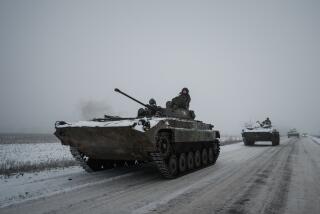No, the Right Course Is Patience
- Share via
Speaking in Washington last week, Irish President Mary McAleese described former Sen. George Mitchell’s efforts in crafting the Irish peace agreement as “the art of diplomacy at its quintessential best.” Intriguingly, McAleese also concluded that the same “macro” skills could be applied elsewhere. The obvious place is Kosovo.
Immediate corrective action is needed if American troops and resources are not to be pulled into another unnecessary European conflict. A good start for the American team would be to realize that Kosovo and Bosnia are entirely separate problems. Other than both being in the Balkans, Bosnia and Kosovo have about as much in common as Argentina and Indonesia. Bosnia was an independent country; everyone realizes that an independent Kosovo would have devastatingly destabilizing regional implications.
Today’s mantra of early intervention is highly ambiguous. Had it been practiced in 1991-92, the secessionist moves of Slovenia and Croatia would have been the obvious target rather than Serbian nationalism.
Undeterred by these niceties, U.S. leaders seem fascinated by the military option. Unresolved is the central contradiction in Western policy: Military action against Serbia will immensely benefit the separatist aims of the Kosovo Liberation Army, which U.S. Envoy Robert Gelbard described two months ago as terrorists.
Consider some of the implications of the West’s de facto support for the KLA. Leaving aside Kosovo itself, where the dense concentration of Orthodox holy sites makes this sacred ground for the Serbs, in Albania the undeclared civil war between ousted dictator Sali Berisha and the elected government of Prime Minister Fatos Nano will move into the open. In neighboring Macedonia, the near 30% Albanian minority will interpret NATO intervention as endorsing their ambition to split away. Meanwhile, Bulgaria is waiting in the wings, ready to revive old territorial claims against Macedonia.
These complexities show that the administration’s obsession with Yugoslav President Slobodan Milosevic is misplaced. It should stop allowing him to create crises to project his image as the Balkan strongman with whom the West must negotiate. This was precisely the effect of the May 12 deal struck by Clinton emissary Richard Holbrooke with Milosevic to open talks with Kosovo Albanian leader Ibrahim Rugova. As his recent book, “To End a War” shows, Holbrooke is mesmerized and psychologically dominated by Milosevic. In a revealing quote, “He bonded with the godfather.”
For once, Congress has mapped the way forward. In March, it passed a resolution calling for U.S. support for the democratic opposition in Serbia. Within Serbia, these democratic forces, bolstered by favorable developments in Republika Srpska and Montenegro, are reaching critical mass. The U.S. should give them aid and encouragement.
If this sounds like a prescription for long-term, low-key patience, it is. Experienced diplomats despair of a Kosovo solution even in theory. Bombs have no place in this volatile mix. A better idea is to call on a negotiator with Mitchell’s talent for quiet, behind-the-scenes operation. Meanwhile, those driven primarily by emotion or ambition should return to the bench.
More to Read
Sign up for Essential California
The most important California stories and recommendations in your inbox every morning.
You may occasionally receive promotional content from the Los Angeles Times.










